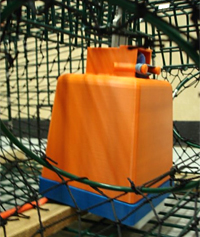Spring-loaded hockey skates. A water-recirculating shower system. A special water mister for firefighters.
 These are just a few of the 10 devices named as inventions of the year in the latest issue of Popular Science magazine – and a Dalhousie invention is among them.
These are just a few of the 10 devices named as inventions of the year in the latest issue of Popular Science magazine – and a Dalhousie invention is among them.
It’s called the Bait Savour, its homonym moniker hinting at its “saver” purpose. The invention was designed to solve a problem faced by lobster fishermen: how to keep from having to make frequent trips out on the ocean to re-bait their traps.
Lobster bait—usually a treated piece of meat stuck on a metal spike inside the trap—isn’t just enjoyed by lobster: a wide variety of sea creatures, from eels to sandfleas to seals, will happily munch on it if given the chance. Generally, traps at sea have to be re-baited every two or three days, a process that can cost fishermen upwards of $700 in fuel per trip, plus crew wages, their boats emitting greenhouse gases as they reset the traps. And if inclement weather strikes, the traps may be bait-free for several days, catching no lobster at all.
“I have many customers that are lobster fishermen, and I heard their problem: the traps remaining without bait for a long period of time, especially in the winter,” says Vince Stuart, owner of Clare Machine Works Ltd. in Meteghan Centre. “But when I heard this pain of theirs, I also heard an opportunity to try and solve it.”
Making it simple
Mr. Stuart knew the solution had to involve a second piece of bait, released at some point during the trap’s stay on the ocean floor, thus halving the number of trips fishermen would need to make to their traps. The issue was finding a solution that not only worked, but also was affordable to local lobster fishermen.
He found a willing partner in Dalhousie’s Innovation in Design lab (iDLab), part of the Faculty of Engineering and led by director Matt d’Entremont. The lab’s mission is to connect Dalhousie engineering expertise with local industrial needs.
“It’s about stimulating the economy,” explains Mr. d’Entremont. “I look at the iDLab as a way to extend the university into commercial industry, identifying problems that local industry partners have and working with those companies to find solutions.”
 In the case of the Bait Savour, Mr. d’Entremont’s team realized their device had to be both affordable and usable, something that a fisherman wearing lobster gloves could easily operate. They junked all the computer chips and compartments that complicated earlier designs and started from scratch.
In the case of the Bait Savour, Mr. d’Entremont’s team realized their device had to be both affordable and usable, something that a fisherman wearing lobster gloves could easily operate. They junked all the computer chips and compartments that complicated earlier designs and started from scratch.
In the end, what they came up with is a biological fuse, a strip of recycled fish parts that biodegrades in salt water, causing no harm to either the environment or the bait. After a couple of days, it simply dissolves, and the attached plastic box releases a second piece of bait. This means the trap can stay in the water, without being picked up and re-baited, for more than double the length of time.
“There are lots of complicated ways to do anything, and anything can be done if you throw money at it,” says Mr. d’Entremont. “But you have to do it in a way that solves the problem and where the value equation works. We’ve made this at a cost and efficiency where it works for fishermen.”
Making a difference in local industry
The Bait Savour is expected to hit the market later this year, with fuses that can last upwards of 80 hours. It’s already won a $100,000 innovation prize from Innovacorp. With more than 3 million lobster traps in Atlantic Canada alone, the potential market is huge. And at a cost in the $50 range, it poses to be a huge cost savings to those who make their living by lobster.
The partners say the recognition from Popular Science, coming in advance of their product hitting the marketplace, is exciting. Mr. Stuart says that he’s been getting calls from around the world asking for more information, and just this week the Bait Savour was featured on the mega-popular tech website Gizmodo.
Mr. d’Entremont is excited by the attention being given not only to the Bait Savour, but the iDlab's contribution to local industry.
“It was hard to believe until we actually saw it in print,” he says. “Even though they’re phoning us, and very serious about it with verification for the facts, we had to see the award print to believe it.”
Video from Popular Science.

